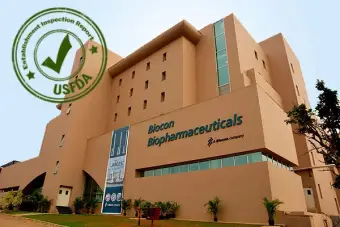Pegfilgrastim API Manufacturers & Suppliers
Find, compare & contact
Filters
Custom request?
Type
Production region
Qualifications
Country of origin
Producer
+ 0
All certificates
Producer
+ 0
All certificates
Producer
Produced in:
Established in: 1995
MOQ: -
Employees: 10000

Fermentation technology Experts

Partnerships with 1200 pharma companies in 100+ countries

US FDA, EMA, COFEPRIES, ANVISA, PMDA accreditations
+ 0
All certificates
Producer
+ 0
All certificates
How does it work?
You can register for free as long as you are registering on behalf of a legal company related to the pharmaceutical industry
Search in the search bar the product that you’re looking for. We’ll show you an overview of all available suppliers. Use the filters to select the relevant suppliers only
Have you found interesting suppliers? Then it’s time to contact them. Use the send inquiry button and send them a message. You can send for each product, 3 inquiries per week
Suppliers get notified by Pharmaoffer that they’ve received a new inquiry. They will come back to you with their questions, certificates, and offer in the chat on Pharmaoffer. We will send you an email in case of any news
Does the supplier meet your quality and commercial requirements? Then you can place the order. Just follow the steps of our order module
Looking for Pegfilgrastim API 208265-92-3?
- Description:
- Here you will find a list of producers, manufacturers and distributors of Pegfilgrastim. You can filter on certificates such as GMP, FDA, CEP, Written Confirmation and more. Send inquiries for free and get in direct contact with the supplier of your choice.
- API | Excipient name:
- Pegfilgrastim
- Synonyms:
- G-CSF , Lenograstim , Pluripoietin
- Cas Number:
- 208265-92-3
- DrugBank number:
- DB00019
- Unique Ingredient Identifier:
- 3A58010674
About Pegfilgrastim
What can you use it for? Pegfilgrastim is a PEGylated form of the recombinant human granulocyte colony-stimulating factor (G-CSF) analogue, filgrastim. It is used to decrease the incidence of infection, as manifested by febrile neutropenia, in patients with with non-myeloid cancer receiving myelosuppressive anti-cancer treatment. Some patients with greater risk factors may develop febrile neutropenia from myelosuppressive therapy and are susceptible to an increased risk of developing infections. Although the risk of developing febrile neutropenia is less than 20% in many readily used chemotherapy regimens infections pose risks of hospitalization and mortalities.
Due to the relatively short circulating half-life of filgrastim, a 20 kDa PEG moiety was covalently conjugated to the N-terminus of filgrastim (at the methionine residue) to develop a longer acting version of the drug Due to a longer half-life and slower elimination rate than filgrastim, pegfilgrastim requires less frequent dosing than filgrastim. However, pegfilgrastim retains the same biological activity as filgrastim and binds to the same G-CSF receptor to stimulate the proliferation, differentiation, and activation of neutrophils. First developed by Amgen, pegfilgrastim was initially approved by the FDA in 2002 and marketed as Neulasta®. It is typically administered via a subcutaneous injection. There are several pegfilgrastim biosimilars (Fulphila®, Pelgraz® or Lapelga®, Pelmeg®, Udenyca®, Ziextenzo®, and Grasustek®) that are approved for the same therapeutic indication by Health Canada, European Union (EU), and FDA.
Ask the supplier for a certificate of analysis to find out more about the quality of Pegfilgrastim.
Pegfilgrastim is a type of Colony stimulating factors
Colony stimulating factors (CSFs) are a vital subcategory of pharmaceutical active pharmaceutical ingredients (APIs) that play a crucial role in the field of biotechnology and medicine. These specialized proteins are responsible for regulating the growth, development, and function of different types of blood cells, specifically white blood cells known as granulocytes and macrophages.
CSFs are extensively used in the treatment of various medical conditions, such as cancer, bone marrow transplantation, and certain blood disorders, where the production and function of white blood cells are impaired. By stimulating the production and differentiation of these crucial immune cells, CSFs help enhance the body's defense mechanisms against infections, accelerate the recovery process, and reduce the risk of life-threatening complications.
Pharmaceutical companies utilize advanced biotechnological techniques to produce synthetic CSFs or isolate them from natural sources, such as mammalian cell cultures. These API products undergo rigorous purification and quality control processes to ensure their safety, efficacy, and compliance with regulatory standards.
In clinical settings, CSFs are administered through injections, typically subcutaneously or intravenously, under the supervision of healthcare professionals. The dosage and treatment duration vary depending on the specific medical condition being treated and the patient's individual needs.
With their significant impact on immune system function and therapeutic potential, colony stimulating factors hold immense promise in the pharmaceutical industry. Ongoing research and development efforts continue to explore new applications and optimize the production and delivery of these essential pharmaceutical APIs.
Pegfilgrastim (Colony stimulating factors), classified under Hematopoietic Agents
Hematopoietic agents are a category of pharmaceutical active pharmaceutical ingredients (APIs) that play a crucial role in the treatment of various blood disorders and diseases. These agents stimulate the production, maturation, and function of blood cells, particularly those involved in the process of hematopoiesis, which is the formation of new blood cells.
One of the commonly used hematopoietic agents is erythropoietin, a glycoprotein hormone that regulates red blood cell production. It is employed in the treatment of anemia associated with chronic kidney disease, cancer chemotherapy, and certain other conditions. Another important hematopoietic agent is granulocyte colony-stimulating factor (G-CSF), which stimulates the production of white blood cells known as neutrophils. G-CSF is used to prevent infections in patients undergoing chemotherapy and to enhance the recovery of blood cell counts after bone marrow transplantation.
Thrombopoietin receptor agonists are another class of hematopoietic agents that promote the production of platelets, essential for blood clotting. These agents find applications in the management of thrombocytopenia, a condition characterized by low platelet counts.
Hematopoietic agents are typically administered through injections or infusions, and their dosage and frequency vary depending on the specific indication and patient's response. While these agents provide critical therapeutic benefits, their use requires careful monitoring to ensure optimal efficacy and safety.
In conclusion, hematopoietic agents are vital pharmaceutical APIs used to stimulate the production of blood cells and treat various blood disorders. Their use significantly improves patients' quality of life and plays a crucial role in managing hematological conditions.
Pegfilgrastim manufacturers | traders | suppliers
We have 4 companies offering Pegfilgrastim produced in 0 different countries.
Get in contact with the supplier of your choice:
- Intas Pharma from United Kingdom, product country of origin India
- Gedeon Richter from Hungary, product country of origin Hungary
- Biocon from India, product country of origin India
- Lek Pharma from Slovenia, product country of origin Slovenia
Let the supplier know whether you are looking for a product with a specific monograph such as EP (Ph. Eur.), USP, JP, BP or another quality. Or, whether you are looking for hydrochloride (HCl), anhydricum, base, micronisatum or a specific purity.
You can use the filters to find high-quality suppliers. For example, you can select GMP, FDA or ISO certified suppliers. Visit our FAQ page or use the chat box in the corner to get more information about Pharmaoffer.









